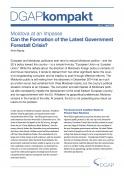Pavel Filip’s appointment as prime minister met with vigorous public protest. In the run-up to the December elections, President Timofti had initially refused to nominate the oligarch Vladimir Plahotniuc, the candidate of the pro-European government coalition. He cited Plahotniuc’s lack of integrity and drew on a constitutional court ruling that declares integrity to be a requirement for the position of prime minister. Considering Timofti’s reputation for not rocking the boat, this move came as a surprise. The government coalition objected that the constitutional court, in another ruling, denied the president the possibility of not appointing a prime minister who had been elected by parliament.
Parliament eventually achieved a majority for the new government and Filip’s election, but only with the help of a new parliamentary splinter group consisting of members of the pro-Russian opposition parties. Filip is thus essentially a compromise candidate, whose role is to enable the formation of a government and prevent the necessity of electing a new parliament.
Moldova’s parliamentary opposition and citizen protesters are calling for new elections in an effort to stem the government’s rampant corruption and loss of credibility. The ruling parties, however, want to avoid elections at all costs, for current polls indicate that the pro-Russian opposition would beat the pro-European camp. What is more, the polls suggest that People’s Power, a party whose supporters include the civic platform Dignity and Truth, would gain entry into Moldova’s parliament. This platform has been instrumental in organizing the demonstrations of the past months, loudly decrying the self-interest of the political class. The group casts itself as the advocate of genuine rapprochement with the EU as opposed to the superficial EU alignment of the governing parties. It remains to be seen whether the common threat of new elections will be enough to cement the power groups of the current coalition or whether their diverging interests will also cost the new government its power. It was, after all, differences of interest that have prevented a government from being formed in recent months.
Read the full article here.

